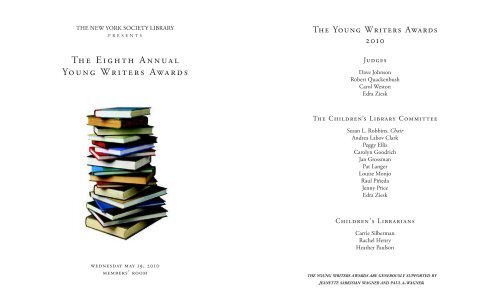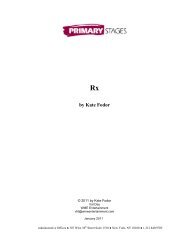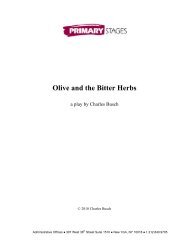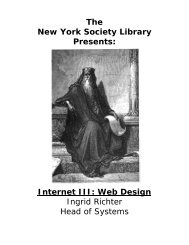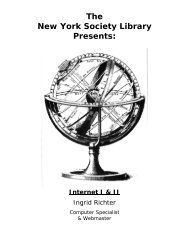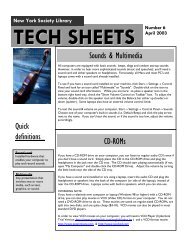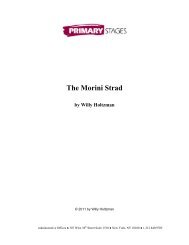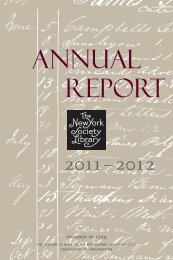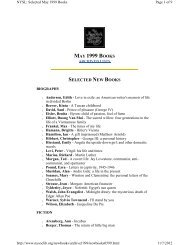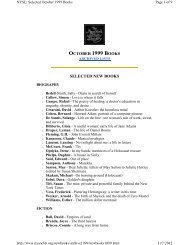The Eighth Annual Young Writers Awards - New York Society Library
The Eighth Annual Young Writers Awards - New York Society Library
The Eighth Annual Young Writers Awards - New York Society Library
Create successful ePaper yourself
Turn your PDF publications into a flip-book with our unique Google optimized e-Paper software.
THE NEW YORK SOCIETY LIBRARY<br />
P R E S E N T S<br />
Th e E i g h t h A n n u a l<br />
Yo u n g W r i t e r s Awa r d s<br />
wednesday may 19, 2010<br />
members' room<br />
<strong>The</strong> <strong>Young</strong> <strong>Writers</strong> <strong>Awards</strong><br />
2010<br />
Judges<br />
Dave Johnson<br />
Robert Quackenbush<br />
Carol Weston<br />
Edra Ziesk<br />
<strong>The</strong> Children’s <strong>Library</strong> Committee<br />
Susan L. Robbins, Chair<br />
Andrea Labov Clark<br />
Peggy Ellis<br />
Carolyn Goodrich<br />
Jan Grossman<br />
Pat Langer<br />
Louise Monjo<br />
Raul Piñeda<br />
Jenny Price<br />
Edra Ziesk<br />
Children's Librarians<br />
Carrie Silberman<br />
Rachel Henry<br />
Heather Paulson<br />
the young writers awards are generously supported by<br />
jeanette sarkisian wagner and paul a.wagner.
Table of Contents<br />
Poetry<br />
Silver Liftin, A Hump of Gold<br />
(Winner, Third and Fourth Grade Category)<br />
Grace Alexandra Chiong, An Osprey in a Tree<br />
(Honorable Mention, Third and Fourth Grade Category)<br />
Bryson D. Wiese, I Am From...<br />
(Honorable Mention, Third and Fourth Grade Category)<br />
Mary Miller, Knitting<br />
(Winner, Fifth and Sixth Grade Category)<br />
Asher Liftin, Poem in Three Views<br />
(Honorable Mention Fifth and Sixth Grade Category)<br />
Isabel H. Adler, the<br />
(Honorable Mention, Fifth and Sixth Grade Category)<br />
Annabel Barry, Snow Flight<br />
(Winner, Seventh and <strong>Eighth</strong> Grade Category)<br />
Gautama Mehta, Clearing a field<br />
(Winner, Ninth through Twelfth Grade Category)<br />
Prose<br />
Emma Yeston, Katelyn and Will’s Great Adventure<br />
(Winner, Third and Fourth Grade Category)<br />
Jacob Aufzien, Pickle Rage<br />
(Winner, Fifth and Sixth Grade Category)<br />
Philip Clark, In the Shadow of the Cross<br />
(Winner, Seventh and <strong>Eighth</strong> Grade Category)<br />
Anna Hitchcock, Civil War Journal<br />
(Honorable Mention, Seventh and <strong>Eighth</strong> Grade Category)<br />
Po e t ry
Silver Liftin<br />
<strong>The</strong> Hump of Gold<br />
<strong>The</strong> hump of a camel,<br />
With golden-brown hair,<br />
Bounces slowly up and down<br />
With every step the glorious creature takes,<br />
Like the heads of children jumping on a black and blue trampoline.<br />
His head is raised slightly to the left<br />
As he stops to watch the yellow mound of Jell-O<br />
Set in the East.<br />
<strong>The</strong>n he blinks,<br />
Those black grapes from God’s garden,<br />
Twice,<br />
And continues slowly<br />
But steadily<br />
Toward his destination.<br />
An Osprey in a tree<br />
so high above.<br />
An Osprey in a tree<br />
so calm and majestic.<br />
High on a mast,<br />
swaying to and fro,<br />
While fishermen cast<br />
for Bass below.<br />
Magnificent Osprey<br />
in shades of gray<br />
white and charcoal,<br />
snatches a dead branch<br />
twice his size,<br />
from weathered Locust<br />
and flies it back<br />
to make his nest<br />
at the top of a great pole.<br />
<strong>The</strong> Osprey sips from a stream<br />
flowing through the forest.<br />
Glittering fish<br />
hide in the stream<br />
soon to be captured<br />
by the Osprey.<br />
Grace Alexandra Chiong<br />
An Osprey in a Tree<br />
<strong>The</strong> mother feeds hatchlings<br />
big juicy trout,<br />
as the father takes his turn<br />
babysitting.<br />
Osprey migrate in May<br />
to <strong>New</strong> <strong>York</strong> City,<br />
Martha’s Vineyard and Maine.<br />
Maybe, just maybe, in May<br />
if you look up at the sky,<br />
you will spy<br />
an Osprey<br />
spying on you<br />
with his little naked eye.<br />
A graceful and elegant<br />
Bird in a tree.
Bryson D. Wiese<br />
I Am From...<br />
I am from<br />
<strong>The</strong> skyscrapers of <strong>New</strong> <strong>York</strong> to<br />
<strong>The</strong> Fire Tower at Gipsy Trail;<br />
I am from<br />
Greenberg’s Bakery to<br />
George’s Diner<br />
I am from<br />
<strong>The</strong> dark ravine of Wall Street to<br />
<strong>The</strong> valleys of Putnam;<br />
I am from<br />
<strong>The</strong> toxic Hudson River to<br />
<strong>The</strong> babbling Whang Hollow stream;<br />
I am from<br />
Glamorous Madison Avenue to<br />
Rocky Trail #9;<br />
I am from<br />
Pine Pond’s gentle lapping to<br />
<strong>The</strong> pounding Atlantic surf;<br />
I am from<br />
<strong>The</strong> tree of Rockefeller,<br />
To snow-covered evergreens;<br />
I am from<br />
Soft feather beds,<br />
To nylon sleeping bags.<br />
Mary Miller<br />
Knitting<br />
Through and around,<br />
Back through again and<br />
Off.<br />
She is somewhere else,<br />
Thinking it through again,<br />
<strong>The</strong>n putting it off.<br />
He is sitting next to me,<br />
I am putting him through,<br />
Trying to make him understand,<br />
and around.<br />
She is putting me through this<br />
Again.<br />
He is going around trying to understand why I hold him off.<br />
Through and around,<br />
Back through again and<br />
Off.
Asher Liftin<br />
Poem in Three Views<br />
1. Corn<br />
Just one<br />
Standing tall<br />
Trying to be the tallest,<br />
But still just one<br />
In a field of others.<br />
2. Note<br />
A poor match girl sits on the sidewalk in winter,<br />
her face is cold and dirty.<br />
She carries in her lap her most prized possession,<br />
a book.<br />
<strong>The</strong> other girls holding their exquisite dolls<br />
with dresses she could only dream of<br />
laugh and throw sticks at her as she sits,<br />
reading.<br />
She falls asleep,<br />
crying.<br />
When she woke up there was a note on top of her book.<br />
It says,<br />
I’m sorry.<br />
3. Intercom to Hell<br />
<strong>The</strong> guilty,<br />
“Please, Nooooo!!!!!”<br />
<strong>The</strong> innocent,<br />
(Silence).<br />
And the snail,<br />
(Silence).<br />
For snails cannot speak.<br />
All snails are innocent.
Isabel H. Adler<br />
<strong>The</strong> word the<br />
always goes<br />
the<br />
before things, never<br />
on its own—<br />
so I decided to give it a poem—<br />
here goes nothing:<br />
ODE TO THE<br />
the always leads up to words<br />
giving them a grand entrance<br />
sentences would sound weird without the:<br />
dog walks in room<br />
pencil writes words down.<br />
<strong>The</strong>re you go the—that was your poem.<br />
Fog curls down from a white sky,<br />
To kiss the mountain in her snowy drape<br />
Trees of dark green fir look on with envy.<br />
Powder pulls at my boots, begging me to stay, with frozen touch<br />
Moisture seeping into thick ski socks.<br />
My skis edge into the frozen ground, feeling the mountain<br />
That my eyes cannot find through the fog.<br />
My light blue ski jacket is lost<br />
In cloud-soft waves of brightest white.<br />
I am blissfully forgotten amid the snow.<br />
Hip angling up the mountain<br />
To counter the forces pulling me downward<br />
Poles searching for a solid place to stop,<br />
Guiding me around, balancing me.<br />
Annabel Barry<br />
Snow Flight<br />
Powder overflowing around my knees.<br />
Blind, gleefully liberated, I hit a knoll, skis bending upwards<br />
Flying, for a split-second, suspended in the white<br />
My skis reach to find ground, regaining balance,<br />
Like a small bird carried on breaths of wind<br />
I gain speed, carving through loose snow, swooping toward the bottom of the trail.<br />
I leave behind the splendid freedom, until next run.
my research:<br />
I read in the newspaper that Haiti needs tents<br />
—the online version of the newspaper—<br />
it said that they’re going to build a “tent city”<br />
for 10,000 people<br />
it said they were “clearing a field in the Croix des Bouquets neighborhood”<br />
I’m just imagining a city of tents, thousands and thousands of tents<br />
when I was little I’d make tents<br />
out of sofa cushions and blankets, and I’d probably have loved to live in the tent city<br />
the reason that they need to make the tent city is:<br />
many people’s houses were destroyed<br />
when two giant bits of rock under the ground bumped into each other<br />
and those people don’t have money so they have to live in tents<br />
and there are so many of them and they have so little money<br />
that according to the article<br />
the International Organization for Migration<br />
is clearing a field in the Croix de Bouquets neighborhood<br />
the International Organization for Migration<br />
counterintuitively doesn’t help birds or fish find their way across the sea<br />
I looked it up online:<br />
“An intergovernmental organization established in 1951, IOM is committed to the<br />
principle that humane and orderly migration benefits migrants and society.”<br />
it calls itself<br />
“the migration agency”<br />
clear a field for the birds.<br />
Gautama Mehta<br />
Clearing a field<br />
P r o s e
Emma Yeston<br />
Katelyn and Will’s Great Adventure<br />
One time in Brooklyn, <strong>New</strong> <strong>York</strong> there lived a girl named Katelyn. She had a brother named<br />
Will. Katelyn was 11 years old and Will was 9 years old. <strong>The</strong>y were living a very happy, normal life<br />
up until the day they found a mysterious map (which I am going to tell you about). Let’s begin our<br />
story…<br />
One afternoon Katelyn and Will were walking home from school on a very windy day. So windy,<br />
it looked like every tree in the park was going to fall down. “I have so much homework!” exclaimed<br />
Katelyn. “Sixth grade gives out waaay too much!” “That’s why I’m lucky,” said Will. “Fourth grade<br />
gives out very little homework. It’s easy too!” “You are a bit lucky,” replied Katelyn. “When you’re in<br />
sixth grade, you’ll wish you were back in fourth.” Suddenly, the wind picked up even more. Leaves<br />
and papers started flying all over the place. “OMG! It’s so windy today!” screamed Will. “I concur!”<br />
said Katelyn. “What’s concur mean, Katelyn?” asked Will. “You’ll learn it in sixth grade,” replied<br />
Katelyn.<br />
After Katelyn and Will had dinner, they went up to their room to chat. “It is bizarrely windy<br />
today,” remarked Katelyn. Suddenly their window flew open! In flew a piece of paper with strange<br />
writing on it. “Hey Katelyn, what’s this paper?” asked Will. “Let me see it,” Katelyn said as she closed<br />
the window tight. “It looks like a treasure map of some sort,” she said again. “From the looks of it I<br />
think it leads to a spot in Prospect Park,” remarked Will. <strong>The</strong> map looked very windblown and wrinkly.<br />
It had many pathways and twists and turns on it that looked hard to follow. ”Maybe it leads to<br />
treasure!” yelled Katelyn with excitement. Katelyn yelled so loud that her mother called up and said,<br />
“Katelyn, Will, are you guys OK?” “We’re fine, Ma!” replied Will. “All right, here’s the plan,” whispered<br />
Will so their parents couldn’t hear. “Tomorrow we’ll go to Prospect Park after school just after<br />
the bell rings and find that treasure!” “I’m in,” said Katelyn. “Let’s do it!”<br />
As planned, the next day after school Katelyn and Will went to Prospect Park to find the (socalled)<br />
treasure they were longing for. “So, wh… if we find the treasure, what should we do with it?”<br />
asked Katelyn. “We’ll put it in the bank and be rich, duh!” replied Will. He looked at Katelyn as if<br />
she were stupid. “Don’t give me that look, mister, I was just wondering,” said Katelyn. Katelyn and<br />
Will had been following the complicated map for one hour already when they finally came to a part<br />
that was easy to follow. “According to the map we should walk 35 steps north, then 20 steps east,<br />
then another 20 steps south,” said Will looking very closely at the map. “I can’t wait to see what we’ll<br />
find!” screamed Katelyn in utter excitement. “That is if we find anything.”<br />
When Katelyn and Will finally reached the destination, they were so excited! So completely excited<br />
that I can’t even describe it! “So sis, you ready to dig up our treasure?” asked Will. “I’ve been<br />
ready all day,” Katelyn said. “Lets go!” So all afternoon Katelyn and Will dug and dug and dug, until<br />
they finally hit something. <strong>The</strong>y were so happy! “Come on Will, help me drag it out, it’s heavy you<br />
know!” said Katelyn in pain. “Coming, Kate,” said Will. <strong>The</strong>y dug the box out and opened it up.<br />
Inside they saw all kinds of different things. From a music box, to a Nintendo DS, candy wrappers,<br />
an iPod, 5 sets of newspapers and magazines, and a cell phone. <strong>The</strong> phone was blinking that it had<br />
a message on it. Katelyn carefully opened the cell phone and listened to the message. It said, ‘dear<br />
people of the future, we, the people of the past, present to you these artifacts from our time of 2010’.<br />
“Huh?” said Katelyn. “What an unusual message. And it’s from the current year? That doesn’t make<br />
any sense?” Katelyn and Will held the box up so people could see how cool they were. But instead<br />
of passersby going ‘WOW, THEY FOUND TREASURE, COOL!!!’, a park ranger came over to Will<br />
and Katelyn. “Why did you kids dig up the Prospect Park time capsule?” the park ranger asked. “We<br />
didn’t know it was a time capsule, sir” said Katelyn. “Yeah, we thought it was treasure, honest,” said<br />
Will in shock. “How did you two find it?” asked the park ranger in confusion. “We followed this<br />
map right here,” replied Katelyn. “Oh, we’ve been looking for that map all day!” exclaimed the park<br />
ranger. “<strong>The</strong> mayor made a speech in the park yesterday when the time capsule was buried. It must<br />
have blown off the podium. Thanks for returning it. ” Katelyn and Will exchanged the same look of<br />
embarrassment. <strong>The</strong>y were both very embarrassed that they dug something up that was buried only<br />
24 hours before. Also, something that was probably meant to be opened 300 years in the future.<br />
“You’re welcome, sir,” they both said at the same time.<br />
That night at dinner Katelyn and Will’s parents asked what they did in the park today. <strong>The</strong>y just<br />
smiled and said, “Oh, nothing.” <strong>The</strong>n they happily continued to eat their meal.<br />
THE END
Why am I not still a cucumber? Why did I need to be afflicted with the evil curse of pickling?<br />
I’ll tell you why, because humans like the taste of pickles! <strong>The</strong>y don’t care about how other species<br />
feel. For example, goose liver pate. <strong>The</strong>y pour mashed corn and wheat down the poor geese’s throats<br />
in excessive amounts, fattening the poor geese’s livers. People then slaughter the geese, mush up their<br />
livers, and eat pate. That is pure cruelty!<br />
I was born a perfectly proportioned, elliptically shaped cucumber. I had neither too many nor<br />
too few bumps and ridges. My spines protected me from predators. I enjoyed the sun, fresh air,<br />
leaves, vines, and my fellow cucumbers. I talked with my friends and enjoyed their company.<br />
“Why do humans hate cucumbers?” I inquired of my friend, Dexter, “What did we ever do to<br />
them?”<br />
“<strong>The</strong>y don’t hate us,” replied Dexter, “they just don’t know that cucumbers have feelings.”<br />
“But they know geese have feelings, and they still produce goose liver pate. Is that not cruel?” I<br />
retorted.<br />
He answered, “Humans care more about their own desires than the rights of other beings. <strong>The</strong>y<br />
are thoughtless, not evil.”<br />
I had no comeback.<br />
<strong>The</strong>n, tragedy struck. A human came to my vine and tried to pick me. First, he squeezed me to<br />
make sure that I was suitable for picking. <strong>The</strong>n he yanked, tugged, and pulled, but I resisted. He<br />
swore and left. He came back with garden shears. <strong>The</strong> evil contraption cut me off the vine, ripping<br />
me away from my family. I was thrown into a bin with hundreds of other cucumbers, waiting for<br />
the agonizing torture of pickling. I saw siblings, other relatives, and neighbors in the bin. I said hello<br />
to Dexter.<br />
“Who’s right now? Don’t you feel the full brunt of human hatred in being ripped away from<br />
your family?” I inquired.<br />
“You are correct,” he admitted.<br />
Jacob Aufzien<br />
Pickle Rage<br />
We were poured from the bin onto a water slide. I thought that we were going to drown during<br />
the washing process. Depending on the evil whims of the human operator, you could get pickled<br />
first or last. I was one of the last to be picked. It was like waiting for a trip into the fiery furnaces of<br />
hell.<br />
I went through the large funnel into a vat filled with water mixed with 5% salt and warmed to<br />
66 degrees Fahrenheit. <strong>The</strong> salty brine burned like the Dead Sea burns a human who has any cuts on<br />
their skin. If only I was as cool as a cucumber now!<br />
I shrank and shriveled while being shoved by other pickles convulsing in the agonizing pain of<br />
pickling. I cried out to the Great Pickle, “How can you let your poor creatures suffer? When will we<br />
escape this Hell?” I could feel the Lactobacillus attacking me, transforming me into a true pickle.<br />
After three weeks, we were removed from the brine gasping at the air. A few weeks ago, the fumes<br />
would have overwhelmed us, but compared to the brine, the air was as fresh as the air in the field<br />
where I had grown on my vine. My relief was short lived. We were placed on a conveyor belt. As<br />
we went along, machines forced us into glass jars.<br />
“Ouch,” I exclaimed as my brother Josh poked me with his stem right into my middle. As another<br />
layer of pickles was being poured on top, I saw Dexter.<br />
“Hey, watch out, Dexter!” I exclaimed.<br />
“Well, if it isn’t you, old friend. <strong>The</strong> torture that the humans have put me through has made me<br />
feel as old as my shriveled exterior,” he replied, “Has hell been a little easier on you?”<br />
I could not reply before a dishonest human factory worker picked Dexter out of the jar, put him<br />
in his greedy mouth, and ate him. May he rest in peace with the Great Pickle.<br />
I was placed in a jar, in the precise middle, surrounded by other pickles. We were pressed tightly<br />
together so that I was surrounded on all sides by other pickles. It was like drowning in a sea of pickles.<br />
A machine then added pickling spices and vinegar. <strong>The</strong> spices reminded me of the various scents<br />
that I recalled from the field. <strong>The</strong> pungent garlic reminded me of the scent of wild garlic in the<br />
spring. I enjoyed looking at the feathery dill flower that I could glimpse through the other pickles.<br />
<strong>The</strong> vinegar, 5% acetic acid, seared my skin. <strong>The</strong> jar’s lid, like the lid on a coffin, sealed my fate. I<br />
was doomed.<br />
<strong>The</strong> jar was placed on a conveyor belt, where a label was applied to the jar. <strong>The</strong>n the jar was<br />
placed in a box, awaiting transport to the supermarket. A truck drove us to the supermarket.<br />
At the supermarket, I was placed in the frigid deli case. I waited. Suddenly, a whorl wind shook<br />
me as the jar was taken from the shelf. I went into a shopping cart. <strong>The</strong>n I was placed on another<br />
conveyor belt to be paid for. After being paid for, the jar was placed in a canvas bag. <strong>The</strong> pickles near<br />
the glass walls of the jar could see what was going on.<br />
Josh said, “I see pastrami and potato chips.”
Somebody else cried, “I see rye bread and mustard!”<br />
All our hearts sank. <strong>The</strong> human carried us to his apartment. <strong>The</strong>re I heard the click of the remote<br />
control as the TV went on. I heard the announcer announce the Super Bowl.<br />
“Oh Great Pickle,” I said, “we are doomed!” I sit on the counter, waiting for the inevitable. I<br />
am about to become part of a Super Bowl snack. I hope it’s quick and painless. Yea, though I walk<br />
through the valley of the shadow of death, I will fear no evil, for the Great Pickle art with me. . .<br />
Philip Clark<br />
In the Shadow of the Cross<br />
<strong>The</strong> moonlight illuminated the portion of the ornate cruciform stain glass window bearing the<br />
image of Jesus Christ, casting a cross-like shadow over the altar below. Under this shadow, Abbess<br />
Teresa stood in front of the altar, garbed in a crimson habit and holding a chalice filled with wine in<br />
her trembling hand. <strong>The</strong> entire population of the monastery, more than one hundred in number, was<br />
seated before her. Most of the monks and nuns assembled were surprised to be here, as this “special<br />
communion” was called at almost a moment’s notice. This was quite out of character for the usually<br />
orderly Abbess Teresa. Among the monks and nuns gathered this evening was young Matthew, who<br />
was trying to make sense of this evening’s hastily-called communion. Matthew was quite fond of<br />
Abbess Teresa. She was a maternal figure to him and, unlike many others in his life, she shared his<br />
more nuanced views of God’s words and the Bible’s scriptures. Matthew had been forced to come<br />
to this monastery by his parents in their attempt to gain favor with the Church and to mould what<br />
they saw as an unruly teenager. His parents often chastised him more for not knowing his place in<br />
the world. <strong>The</strong> breaking point for his family occurred three years ago when Matthew tried (with no<br />
success) to prove that the local bishop of the town was at the center of a major scandal. After that<br />
incident, they sent him packing to the monastery. “To gain discipline and clear your mind”, they<br />
declared to him as they dropped him at the main gate of the monastery. On that first day, as he<br />
made his way towards the guest house, he ran into none other than Abbess Teresa. She brought him<br />
to the refectory for a hot meal and then took him to the dormitory, where she introduced him to the<br />
senior monk, Brother John, who was to be in charge of young Matthew’s formal monastic training.<br />
Ever since that first encounter, Teresa had always been a kind soul to Matthew, whether it was excusing<br />
him from penance for his occasionally “heretical questions” or making sure he got enough to eat.<br />
Before this very moment, he thought he truly understood her. But her actions today, the wearing of a<br />
crimson habitat, her nervous demeanor, the hasty calling of communion, all seemed out of character<br />
and were bewildering to him.<br />
Her only words to him, in a chance corridor meeting before the communion began, was “I must<br />
bear my soul today to God and Man. My heart’s confession can endure prison’s bounds no more.”<br />
Matthew’s eyes were riveted to the Abbess as she began speaking. “I have called you all here today<br />
on the briefest of notice and I am very grateful that you have come. However, the matter that I will<br />
discuss is grave and many of you will not look kindly on me after my words leave my lips. I must<br />
tell you a sordid tale of sin and deception, rooted in these same very holy walls where we live, sleep<br />
and pray.” <strong>The</strong> assemblage gasped, but Teresa quickly quelled them with a wave of her hand. “I have<br />
made my confession to God himself before you arrived and He told me that it was His will that I<br />
share my confession with all of you. But before I tell you my tale I am compelled first to complete<br />
my Holy Communion and drink the blood of Christ.” <strong>The</strong>y all watched as she closed her eyes tightly
and drank from the cup. Putting the chalice down she then raised her hands and began speaking.<br />
“Good men and women, I have committed a sin”, she stammered.<br />
<strong>The</strong>n, all at once, her eyes widened and her words were replaced by a horrid gurgling sound.<br />
Matthew and the others assembled watched in horror as she fell to the floor, writhing in pain. Her<br />
eyes darted wildly as if searching for someone or something. <strong>The</strong>y stopped suddenly and, with what<br />
seemed great effort, she rose and grabbed a nearby Bible, only to fall again. Unable to speak, she began<br />
turning through pages rapidly, until at last, she stopped abruptly. Seconds later, her rapid breathing<br />
slowed and she was still. <strong>The</strong> onlookers stood in shock, unmoving, each unsure what to do next.<br />
<strong>The</strong>ir stunned silence was broken by the clanking sound of the great metal double-doors at the back<br />
of the church as they swung open. Through the doors strode, in a most imperious fashion, Abbott<br />
John, the former senior monk of the monastery.<br />
“I apologize for my tardiness”, Abbott John began, “I was delayed in my travels by-”, the Abbott<br />
started to say but his words were cut short at the sight of Abbess Teresa’s lifeless body laying<br />
at the foot of the altar. <strong>The</strong> Abbott, a tall handsome older man with greying hair and dark black<br />
eyebrows, moved briskly to the altar and crossed himself. He knelt beside Abbess Teresa’s body and<br />
put a hand to her neck. “She is dead!”, he declared. He examined the chalice, broken but still filled<br />
with wineand carefully picked it up. He swirled around the contents of the chalice and then, drew a<br />
deep, deliberate breath through his long nose. “As you know, I am practiced in the art of medicine.<br />
It saddens me profoundly to say that I the cause of the Abbess’s death is poison, wolfsbane from the<br />
Perennial plant to be precise”.<br />
Over the chaos of shouts and cries, Abbott John asked for silence and ordered all but the most senior<br />
members of the clergy to leave the church immediately and return to their dormitories. Slowly,<br />
yet obediently, the monks and nuns began to file out of the church. Matthew followed the others<br />
out the side door, into an annex adjacent to the main chapel, and then into the underground passage<br />
that led to the dormitories. When they reached the end of the passage, Matthew, stricken with<br />
grief, somehow made his way into the dormitory and collapsed into his cot. <strong>The</strong> events of the day<br />
had been most unnerving, so while the other novices slept soundlessly, Matthew tossed and turned<br />
on what seemed like a bed of nails. When the first rays of dawn came, Matthew decided to take a<br />
walk through the monastery to clear his mind before the others awoke. He came to a halt as he heard<br />
hushed voices on the other side of the corridor. Matthew recognized the voices as belong to Abbott<br />
John and a few other senior monks. “One of her hands pointed to a verse from<br />
the book of John: He light shines in the darkness. . . and her other hand pointed to Verse 6 and 7:<br />
<strong>The</strong>re appeared a man named John he . . . came as a witness to testify the light. . She must have been<br />
driven mad by the poison.”, one monk said. Matthew thought, <strong>The</strong> Abbess knew every verse of the<br />
holy bible. This cannot be a coincidence. A thought then crossed his mind. What if she was trying to<br />
send us a message about the name of her murderer! He thought for a minute and then remembered<br />
the cruciform window illuminating the hand of Christ. Perhaps the communion was not so hastily<br />
called. Perhaps the Abbess knew that, with the moonlight shining at that time of the night, the<br />
window would be illuminated and that it would serve as a message in case she was unable to deliver<br />
it herself? What if the hand points somewhere?<br />
“Enough, Brothers, I regret to say that I believe I know who the murderer is. It has to be the<br />
young novice Matthew”, the Abbott said with conviction. <strong>The</strong> monks stared at the Abbott in uniform<br />
disbelief while Matthew, standing at the other side of the door, had to put his fist to his mouth<br />
to restrain himself from shouting. “I saw him in the garden earlier in the day, I thought nothing<br />
of it at the time but now I realize that he must have stolen a Perennial plant from the garden and<br />
poisoned the Abbess’s wine glass.” <strong>The</strong> monks gasped at the Abbott’s accusations some shaking their<br />
bowed heads, others crossing themselves. <strong>The</strong> Abbott stopped for a moment to assess the reaction of<br />
the monks and then pressed on. “I have been studying the two of them for a while. I witnessed that<br />
they became close …. unnaturally so,” the Abbott said, arching one of his dark eyebrows. “Perhaps<br />
the Abbess was pressed to break her vow of chastity by the young novice and when she rejected him,<br />
he reacted, with fury and guided by Satan’s designs. <strong>The</strong>re is also his history of heretical questions<br />
that casts any pretense of his innocence in doubt. We must bring this villain to God’s justice.” Matthew<br />
heard the monks murmur in agreement. Matthew backed away from the voices and dashed off<br />
to the right, running as fast as his trembling legs would allow toward the exit of the dormitory. He<br />
needed a hiding place. As he left the dormitory, he remembered the boarded-up well near the fish<br />
ponds. He ran there, pulled up a few of the boards at the top of the well, and lowered his body into<br />
the dark opening. As he sat crouched in the cold, stone well, he heard the sounds of rats scurrying<br />
near his feet and the voices of monks outside shouting his name.<br />
Matthew waited until nightfall and then, when he was sure there was no one near the well, left<br />
his hiding place. He gave a shiver as the wind cut through the course, ascetic fabric of his habit. He<br />
swept around the outside of the church, circling it, until he reached the altar’s cruciform window.<br />
Just like the previous evening, the moonlight illuminated the hand of Christ, pointing in the general<br />
direction of the the Cloisters and the Scriptorium. Even in the jet-black night, Matthew recognized<br />
the Scriptorium, a building in which he spent many days copying manuscripts . Hearing voices<br />
behind him, Matthew dashed off into the darkness and across the Cloisters. Before him lay an oak<br />
door, one he knew well. It was the door to Abbess Teresa’s private study, for before she had become<br />
an Abbess, she had worked here and had been a talented illuminator. Matthew turned the knob of<br />
the door and, oddly enough, found it unlocked. He entered quietly making sure to shut the door<br />
behind him and lock it.<br />
<strong>The</strong> study was furnished with a simple desk and a stool. Upon the desk lay a pile of Bestiaries.<br />
Matthew strode over to the desk and something curious then caught Matthew’s eye: written across<br />
the top a Bestiary was a dark, black cross. Matthew carefully lifted this Bestiary and began to study<br />
it. It was the Whore of Babylon, riding on her beast the Sirrush. She was a dreaded symbol within<br />
the Christian faith, representing all affairs, fornification, and sexual crimes against God. Matthew<br />
could not help but think that this bestiary were not left here by accident that the Abbess left it at the<br />
top of the pile for a reason. What could these mean? Matthew thought to himself. He pondered this
symbol for quite awhile and then decided he had been there for too long. Matthew stepped forward<br />
toward the door and, as he did, he he heard a clink of metal under his foot. Matthew looked down<br />
to see a ring, with an empty socket, inscribed with the initials “AJ”. Realization crept in Matthew’s<br />
mind, as he looked from the ring to the Bestiaries and back again. Holy Father help me!, Matthew<br />
thought in terror. Matthew began to search frantically around the study, until he heard a soft “clink”<br />
under his foot. He bent down and retrieved the object. It was a small red stone, a perfect match for<br />
the ring he had already found. He continued searching, until he came across a letter lying on the<br />
Abbess’s chair, written in the Abbess’s handwriting, which Matthew began to read. He read the letter,<br />
once, twice, three times and, tears filling his eyes, he folded the letter and put it inside the cloak.<br />
<strong>The</strong> letter confirmed his worst fears, but he now had all of the proof he needed to bring the Abbess’s<br />
killer to justice. It was then he realized he was not alone, before him stood Abbott John.<br />
“<strong>The</strong> other monks will be here soon. Our time together will be short” his raised hand holding<br />
a large knife, with the sleeve above the knife bearing the monogrammed initials “AJ”. “If you have<br />
questions for me before your execution tomorrow at dawn, now is the time to ask them. I do not<br />
wish for a man to go to the grave not knowing the truth behind his unmaking.”<br />
“Did she go with your willingly, out of love?” asked Matthew, his fists clenched in rage.<br />
“Of course not, though it was my wish she would. I did so love her beauty. No, she accepted me<br />
not out of love or attraction but to protect you. Did you ever consider why you were not punished<br />
for your heretical views? She succumbed to me because the alternative would have been the severest<br />
of punishments for you, perhaps even death. I used her love for you to my advantage that is, until<br />
one day last week, when she told me she could break her vows no more. At first I was consumed by<br />
the fear of being exposed but then came an epiphany: I could rid myself of the Abbess, my accuser,<br />
and a nettlesome boy as well, a boy who himself had accused my brother, the Bishop, of a crime.<br />
When I learned of her plans for a “special communion”, I knew that God have given me the opportunity<br />
to save the reputation of the church. So, in a sense, you did kill the Abbess young Matthew or<br />
at least the pure love you shared for each other resulted in her death. ”<br />
“I won’t let you get away with it, I have proof!” exclaimed Matthew, thinking of the Whore of<br />
Babylon, which proved the affair which showed the two were together and, the most compelling<br />
evidence, the Teresa’s written confession.<br />
“Yes, you do,” the Abbott replied, in a false fatherly tone. “But don’t you see, your proof disproves<br />
Teresa’s chastity; my proof is a testament for all time that she kept her vows. You see, it is<br />
really your choice: are you willing to sacrifice yourself for Teresa?”<br />
“She was willing to reveal the truth, why shouldn’t I have the same courage?” answered Matthew.<br />
“Because it was her truth to reveal, not yours,” John responded and inched closer, knife at the ready.<br />
With tears in his eyes, Matthew took the letter from his cloak and held it over the candle’s flame,<br />
watching as Teresa’s confession turned to ashes, but he caught a glimpse of light out of the window.<br />
“You have done the right thing, Matthew, by preserving Teresa’s reputation. I promise your<br />
execution tomorrow morning will be merciful and that your family will be well cared for after your<br />
death.” the Abbott said, “Understand”, he continued chuckling, “My murder of Teresa was the in<br />
love of god”. At this last sentence, the door flew open and a dozen senior monks rushed in.<br />
“You lied!”, one cried, “You, the Abbott, betrayed God, you shall be excommunicated till<br />
the end of your days!” At this, the monks swarmed forward toward the Abbott, reaching for<br />
him.<br />
“You cannot!”, Abbott John protested, “You would not”, he cried. As he saw they would not<br />
relent, he raised his dagger, fell to his knees and drove it into his own heart.<br />
Matthew stood before the new Abbott taking his final vows in the dying sunset. He spoke the<br />
vow of Chastity, Poverty, and finally, with a little regret, the vow of obedience. After the death of<br />
John, Matthew had been pardoned from the monks’ accusation and the murder had been put to rest.<br />
Matthew was now looking forward to the quiet life in the Scriptorium and Schoolrooms as a monk.<br />
While a monastic life may not be the one Matthew chose, but it was one he was willing to accept.
Anna Hitchcock<br />
Civil War Journal<br />
July 2, 1863<br />
I woke today at 4 in the morning. I was tired, but I was also so nervous that I couldn’t stay asleep<br />
any longer. We were positioned on a small ridge, which overlooked Emmitsburg road. Beyond that<br />
was a valley leading into Cemetery ridge where the Union troops were positioned. I could see that it<br />
would be very near impossible to attack the Union troops on their ground. <strong>The</strong> hill had no coverage<br />
and was very steep. Please dear God, I prayed, don’t make me lead the men up there.<br />
Soon after breakfast we received orders that Longstreet’s 1st corps were attacking the Union further<br />
down the line. As soon as they had passed us, we were to march down across the road and attack<br />
Cemetery ridge. Exactly what I had prayed not to happen. I drank a hell of lot of coffee after I heard<br />
that order, and maybe a bit of whiskey too. Longstreet hadn’t even passed us yet, so I assumed we<br />
had a long wait. I was right. We waited on that ridge for hours. <strong>The</strong> men shared war stories or played<br />
cards. I sat near a group built up of some other men from the 8th Florida and listened to them talk.<br />
<strong>The</strong>y started talking about the war and the reasons they were fighting. Most of them had clear ideas<br />
of independence, and I found myself nodding along as they talked of justice and fair treatment for<br />
all the states. I realized that this was what gave so many men the courage to fight; these noble reasons<br />
were their cause.<br />
______________________________________<br />
We finally prepared to march down to the road at 5 o’clock. I got my men in order, and tried my<br />
best to disguise my fear. With the rest of Perry’s brigade, we marched down the hill toward the other<br />
side of the valley. <strong>The</strong> Union did not worry about wasting ammunition on us; we were under a hail<br />
of shot and shell and bullets the whole way. <strong>The</strong> terrain was flat and was covered only by a few shrubs<br />
and trees, and I could not help admiring my men as they plunged into the battle with such spirit.<br />
<strong>The</strong>y inspired courage into me. Shouting and yelling we met the first line of the Union at the road.<br />
<strong>The</strong>y were positioned in a line of Batteries and strongly supported by infantry. Most of the men who<br />
had to load up their heavy muskets were killed, and some of them back fired and exploded in their<br />
faces. I was glad to have a pistol instead.<br />
______________________________________<br />
We attacked that first line of troops with such power that they were swept back almost immediately.<br />
We fought on and on and slowly we crept up to the edge of Cemetery ridge, but many<br />
men were lost. I saw them fall to the ground with the quick ripping puncture of a mini ball, or fly<br />
through the air, blasted and torn with the power of canister or grape fire. Finally we reached the<br />
creek. We could see the top of the ridge and I almost believed it possible for us to take it. Nothing<br />
was in my mind right then but rallying the troops and taking that ridge. Lang came around to make<br />
sure we were all in position for this last attack, and then he gave the order to charge. <strong>The</strong> way had<br />
looked clear to me before, but there were a few Union soldiers in front of us. We drove them away<br />
effortlessly with a cheer.<br />
______________________________________<br />
We were fast approaching the ridge and we had just crossed over the creek, but I now realized<br />
that the few soldiers we had just driven away had gone for enforcements. We were walking right into<br />
them! <strong>The</strong>re must have been 400 men waiting for us beyond the creek. <strong>The</strong>y waited ‘till they must<br />
have been able to see our faces clearly, and then they fired with no mercy. I watched men being torn<br />
to shreds by the metal balls whirring past my face. A young color bearer was still leading the troops<br />
onward with a determined look on his face. I looked up into the enemy faces to see an officer point<br />
to a cannon then point to the young boy. He didn’t have time to change the expression on his face.<br />
Suddenly an anger like I have never before felt came over me. I will tell you this: throughout all the<br />
battles I have been in these last years, I have shot and killed many men, but I have never wished<br />
them pain. I don’t know why I have killed them before, but this time I knew I wanted that man to<br />
die. I gave him every bullet I had and, I stood there to watch him die. I can’t get over that moment<br />
in my head. I felt so victorious but also so horrible. When you fight a war, you always assume you are<br />
the hero, but looking back on that moment, I think that maybe I’m not the hero.<br />
We retreated because we were obviously being overpowered by these new enforcements. I led my<br />
men back to our positions and camp, but I wasn’t paying attention really. I kept waiting for the guilt<br />
to come like a prisoner waits for the execution, but it didn’t come. I’m going to bed. Oh, right. I was<br />
right last night. I do recognize the smell tonight; the smell of the second night at a battle field.<br />
______________________________________<br />
July 2—sometime in the middle of the night—1863<br />
I’ve been thinking about that man I shot. I saw him go down, and clutch his chest in surprise<br />
and pain. <strong>The</strong>re’s no doubt that they couldn’t have saved him. He died.<br />
<strong>The</strong>y say war is supposed to harden you. Most of the men out there are hardened; they cheer<br />
when they hit someone, and when they see them die in a bloody mess. In the beginning I just<br />
couldn’t get used to it. I felt guilty about every man I shot, but today something changed. I haven’t<br />
felt guilty about practically torturing him. Right now my lack of guilt is worse than the guilt was<br />
before. Am I finally “losing myself” out here?<br />
______________________________________
July 3, 1863<br />
I slept too late today, but when I did get up I was ready for battle. This is how I reasoned it out<br />
last night. This new attitude towards battle is generally a good thing. I realize now that I have adopted<br />
the other men’s ways and I mow am fighting for myself and independence, not just my Pa. <strong>The</strong><br />
new tolerance for killing is good now that I am fighting for my own reasons and I really have a cause.<br />
It wasn’t O.K. before because I was killing for no good reason of my own. That’s why I have been<br />
feeling so guilty. I had never thought of this war except as a chance to prove myself, but I now realize<br />
it is a lot more than that. <strong>The</strong>se are human emotions and human rights we’re fighting for.<br />
I had a late breakfast, and I found myself talking easily with the other men. I met another captain<br />
from the 8th Florida regiment who had a lot in common with me. He was from a town near<br />
the one I grew up in, in North Florida. We talked until we were both called by General Lang for our<br />
orders.<br />
Lang had called together the captains and Colonels of our brigade, and he explained the situation<br />
to us. Longstreet and his 1st corps had been ordered by Lee to attack the center of the union army.<br />
We were to be the supporting column for this attack along with Wilcox’s Brigade. We were to follow<br />
Pickett’s division and be his support when needed.<br />
After I heard this I abandoned the other officers and went to think things over by myself. I knew,<br />
well, I could tell from the ground that this would be a very hard battle, if it was even a battle and<br />
not a massacre. I shuddered at the thought, but I was not afraid. A lone, premature tear ran down<br />
my cheek at the thought that most of my men would be gone by the end of the day; we were already<br />
down to 35 since yesterday. This battle was turning out to be fatal for my sorry little pack of Floridians.<br />
We sat wallowing in our anticipation until 3:30, when Pickett was about to charge. Following<br />
Wilcox’s lead, our Brigade began to make our way to where Pickett would attack. When we arrived<br />
we stood behind the attacking men someways and waited in positions ready to march. <strong>The</strong>n Pickett<br />
received the order to go, and they were on their way. I watched their bloody trail with the horrible<br />
knowledge that I would be following it soon enough.<br />
______________________________________<br />
Our Brigade’s cheers soon turned to solemn silence and they watched good men being slaughtered.<br />
Longstreet’s men marched bravely towards Cemetery ridge with the intention of taking it,<br />
but this aspiration was too much to hope for. Men were killed in droves; blasted off the ground by<br />
the long range artillery at first and then canister and musketry. It was the most horrible attempt at a<br />
battle that I have ever seen. <strong>The</strong> most bloody, cruel, useless waste of good men; I felt tears streaming<br />
down my cheeks as I watched.<br />
20 minutes after they charged we were ordered to go in also. For a while we retraced their exact<br />
footsteps, stepping over bodies and limbs as we too were practically scattered. I could see my men<br />
dying by the minute, but I called the remaining together, and we marched onward through the<br />
smoke. <strong>The</strong> smoke, it turned out, was a big problem, for we soon lost our way. Instead of following<br />
Pickett as we had planned, our Brigade was separated from Wilcox, and we started to drift southward<br />
towards the place we had fought at yesterday. Stopping to rearrange our selves and get in order, I<br />
noticed that Brigade had shrunk majorly in the last 10 minutes. My own company was now down to<br />
26 men, and we hadn’t even had the chance to fire a gun.<br />
<strong>The</strong> smoke was still horrible; it choked us and stung our eyes, and it was so thick we couldn’t see<br />
20 feet in front of us. All of a sudden, Union troops stumbled into view in front of us, not 30 feet<br />
away. Gathering ourselves up with a dazed feeling, we attempted to fight our way through this new<br />
attack, but it was simply too much for our wounded Brigade. Many of us fell to the ground, or were<br />
immediately killed. I felt a bullet rip into the skin above my cheek, and a spasm of pain shot through<br />
my face.<br />
Reaching up, I felt the torn skin and put a handkerchief to it to stop the blood. Calling my<br />
remaining troops together, I signaled for a withdrawal. Slowly, we retreated in confusion, and the<br />
Union troops, who needed a rest also, did not follow.<br />
In slow defeat, we retreated to our camp. I’m pretty sure that every single one of those men were<br />
seeing Pickett’s horrible, gruesome charge play over and over again in their heads. I could not stop<br />
seeing corpses. My eyes were watering with the sorrow of it, and at that moment I could not think<br />
of a single happy thing in the world. How could they all die like that? Just wiped of their life at such<br />
a prime. Later I calmed down. I bandaged my face up with an old shirt, but I didn’t bother to see a<br />
doctor. <strong>The</strong> wound isn’t really that bad. Besides, I don’t feel like having to talk to another human.<br />
It was getting dark when I emerged from my tent, and I stood looking over the battle field.<br />
Through the dusk and remaining smoke I could make out the fleshy whiteness of bodies lying pitifully<br />
on the slope and in the field. It still didn’t seem real. All those bodies lying there used to mean<br />
something to someone, but now they were just lumped together. Lumped together by the people<br />
who wanted the result. Wanted the result of the war no matter how it happened. All of them martyred<br />
for the cause but none of them sainted.


